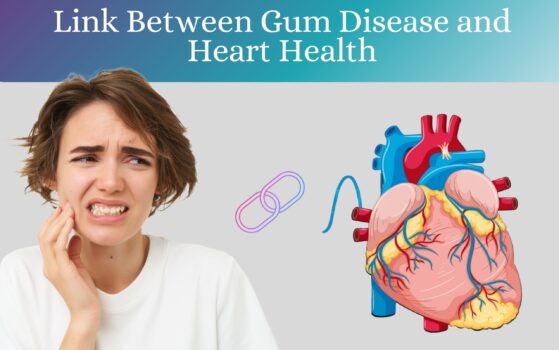The Link Between Gum Disease and Heart Health: What You Need to Know
Most people think gum disease is just about bad breath and bleeding gums. But did you know it could also harm your heart? That’s right. Your mouth and heart are more connected than you might imagine.
What Is Gum Disease?
Gum disease, known as periodontal disease, is an infection that affects the gums. It occurs when bacteria accumulate on your teeth and gums. If not addressed, it can result in tooth loss. Additionally, it can have an impact on your overall health as well.
How Gum Disease Develops
It all starts with plaque. Plaque is a clingy layer of bacteria that develops on your teeth. If you don’t brush and floss regularly, plaque hardens into tartar. Once tartar builds up, bacteria attack your gums, causing inflammation. This leads to gingivitis, the early stage of gum disease.
If gingivitis is left untreated, it may progress to periodontitis. At this stage, gums pull away from teeth, forming pockets filled with bacteria. These bacteria can enter your bloodstream, affecting other parts of your body.
The Gum-Heart Connection
Scientists have found a strong link between gum disease and heart problems. Here’s how:
1. Inflammation Spreads
When your gums are inflamed, your body produces substances that can also inflame blood vessels. This can increase the risk of heart disease.
2. Bacteria Enter the Bloodstream
Bacteria from infected gums can travel through your bloodstream. They may attach to the heart’s arteries, causing blockages that lead to heart attacks.
3. Higher Risk of Stroke
Studies show that people with gum disease have a higher chance of stroke. The inflammation from gum disease makes blood vessels less flexible, increasing blood pressure and stroke risk.
Signs You Might Have Gum Disease
Many people don’t realize they have gum disease until it gets serious. Here are some warning signs:
- Bleeding gums when brushing or flossing
- Swollen or red gums
- Bad breath that won’t go away
- Loose teeth
- Receding gums
If you notice these signs, don’t ignore them. Early treatment can prevent serious problems.
How to Protect Your Gums and Heart
The good news? Gum disease is preventable! Follow these simple steps to keep your gums and heart healthy:
1. Brush and Floss Daily
Brush twice a day and floss once daily. This removes plaque before it turns into tartar.
2. Use Mouthwash
Using an antibacterial mouthwash can effectively eliminate bacteria and minimize plaque buildup.
3. Eat Healthy Foods
Avoid sugary snacks. Eat more fruits, vegetables, and dairy products that strengthen your teeth and gums.
4. Quit Smoking
Smoking compromises your immune system, making it more difficult to combat gum infections.
5. Visit the Dentist Regularly
Regular dental checkups catch gum disease early. Your dentist can remove tartar that brushing alone can’t handle.
Who Is at Risk?
Some people have a higher risk of gum disease than others. You might be at risk if you:
- Have diabetes
- Smoke or chew tobacco
- Have a family history of gum disease
- Have poor oral hygiene habits
- Are under high stress
If you fall into these categories, be extra careful with your oral health.
Can Treating Gum Disease Improve Heart Health?
Yes! Studies show that treating gum disease can lower heart disease risk. When you control gum inflammation, your heart benefits too. A healthier mouth means a healthier body.
Final Thoughts
Your gums are not just about your smile. They play a big role in your overall health. Taking care of your gums can help protect your heart. Small daily habits, like brushing and flossing, can make a huge difference.
Let Elite Smile Family Dentistry Help You
At Elite Smile Family Dentistry, we care about more than just your teeth. We help you protect your gums and overall health. Our expert team provides deep cleanings, gum disease treatments, and preventive care. Let’s keep your smile and heart healthy together. Book an appointment today and take the first step towards a healthier life.
Frequently Asked Questions
How long does gum disease treatment take?
The duration of treatment depends on how severe the gum disease is. Mild cases can improve within a few weeks with proper care. More advanced cases may take months of deep cleaning and professional treatment.
What treatment is used for gum disease?
Treatment varies based on severity. Mild cases may require better oral hygiene and professional cleanings. Advanced cases might need deep cleaning (scaling and root planing), antibiotics, or even gum surgery.
How painful is gum disease treatment?
Most treatments are not very painful. Deep cleaning can cause some discomfort, but dentists often use numbing agents. If surgery is needed, pain is manageable with medication.


